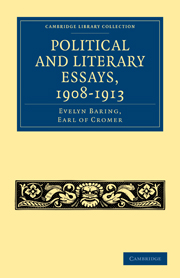Summary
“The Nineteenth Century and After,” February 1904
The autobiography of my old and highly esteemed friend, Lord Wolseley, constitutes an honourable record of a well-spent life. Lord Wolseley may justifiably be proud of the services which he has rendered to his country. The British nation, and its principal executive officials in the past, may also be proud of having quickly discovered Lord Wolseley's talents and merits, and of having advanced him to high position.
Obviously, certain conclusions of public interest may be drawn from the career of this very distinguished soldier. Sir George Arthur, in the December number of the Fortnightly Review, has stated what are the special lessons which, in his opinion, are to be derived from a consideration of that career.
Those lessons are, indeed, sufficiently numerous. I propose, however, to deal with only two of them. They are those which, apparently, Lord Wolseley himself wishes to be inculcated. Both involve questions of principle of no little importance.
In the first place, Lord Wolseley, if I understand rightly, considers that the army has suffered greatly from civilian interference. He appears to think that it should be more exclusively than heretofore under military control.
In the second place, he thinks that, in certain cases, the political and diplomatic negotiations, which generally follow on a war, should be conducted, not by a diplomatist or politician, but by the officer who has conducted the previous military operations.
- Type
- Chapter
- Information
- Political and Literary Essays, 1908–1913 , pp. 107 - 126Publisher: Cambridge University PressPrint publication year: 2010First published in: 1913

